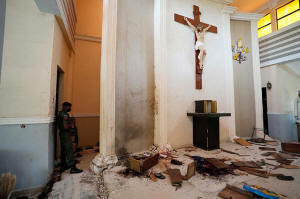A US senator claims 'Christian mass murder' is occurring in Nigeria. The
data disagrees
[October 17, 2025]
By OPE ADETAYO
LAGOS, Nigeria (AP) — U.S. Sen. Ted Cruz has been trying to rally fellow
evangelical Christians and urge Congress to designate Nigeria as a
violator of religious freedom with unfounded claims of “Christian mass
murder,” which the government of the West African nation has vehemently
rejected as false.
Cruz, a Republican member of the Senate Foreign Relations Committee,
wants Nigeria to be designated a country of particular concern as one
with “severe violations” of religious freedom. Designated countries
include Pakistan, Afghanistan and China. A designation could result in
U.S. sanctions. The bill he introduced last month is awaiting action by
the Senate and there is no certainty of it being approved.
Cruz' claims have been amplified by some celebrities and commentators in
the U.S., without evidence, with some going as far as alleging a
“Christian genocide." Cruz' office did not respond to questions,
including about his motivation for the allegations.
Here's what to know.
Both Christians and Muslims are killed
Nigeria’s 220-million-strong population is split almost equally between
Christians and Muslims. The country has long faced insecurity from
various fronts including the Boko Haram extremist group, which seeks to
establish its radical interpretation of Islamic law and has also
targeted Muslims it deems not Muslim enough.

Attacks in Nigeria have varying motives. There are religiously motivated
ones targeting both Christians and Muslims, clashes between farmers and
herders over dwindling resources, communal rivalries, secessionist
groups and ethnic clashes.
While Christians are among those targeted, analysts say the majority of
victims of armed groups are Muslims in Nigeria's Muslim-majority north,
where most attacks occur.
Both Muslim and Christian communities, and groups, have at various times
alleged “genocide” during religiously motivated attacks against both
sides. Such attacks are often in the north-central and northwestern
regions struggling, among other forms of violence, with farmer-herder
conflict that is between farming communities — predominantly Christians
— and Fulani herders who are mainly Muslims.
Joseph Hayab, a former chairman of the Christian Association of Nigeria
in Kaduna state, among the worst hit by the insecurity, disputed claims
of “Christian genocide.”
While thousands of Christians have been killed over the years, “things
have been better than what they were before," Hayab said, warning,
however, that every single death is condemnable.
Nigeria's government rejected Cruz' claims, which have been discussed
among Nigerians. “There is no systematic, intentional attempt either by
the Nigerian government or by any serious group to target a particular
religion," Information Minister Idris Muhammed told The Associated
Press.
[to top of second column]
|

A police officer stands guard inside the St. Francis Catholic
Church, a day after an attacked that targeted worshipers in Owo,
Nigeria, June. 6, 2022. (AP Photo/Sunday Alamba, File)

Nigeria was placed on the country of particular concern list by the U.S.
for the first time in 2020 in what the State Department called
“systematic violations of religious freedom.” The designation did not
single out attacks on Christians. The designation was lifted in 2023 in
what observers saw as a way to improve ties between the countries ahead
of then-Secretary of State Antony Blinken's visit.
Responding to the latest claims from U.S. commentators, the Christian
Association of Nigeria said it has worked to draw attention over the
years to “the persecution of Christians in Nigeria.”
In its 2024 report, the U.S. Commission on International Religious
Freedom highlighted attacks targeting both Christians and Muslims in
what it called systematic religious freedom violations in Nigeria.
"Violence affects large numbers of Christians and Muslims in several
states across Nigeria,” the commission added.
What the data says
Data collected by the U.S.-based Armed Conflict Location and Event Data
program shows 20,409 deaths from 11,862 attacks against civilians in
Nigeria between January 2020 and this September.
Of those, 385 attacks were “targeted events against Christians … where
Christian identity of the victim was a reported factor,” resulting in
317 deaths, ACLED says.
In the same period, there were 417 deaths recorded among Muslims in 196
attacks.
While religion has been a factor in Nigeria's security crisis, its
"large population and vast geographic differences make it impossible to
speak of religious violence as motivating all (the) violence,” said Ladd
Serwat, senior Africa analyst at ACLED.
Analysts reject claims of genocide
Analysts say Nigeria’s complex security dynamics do not meet the legal
definition of a genocide. The U.N. convention on preventing genocide
calls it acts “committed with intent to destroy, in whole or in part, a
national, ethnical, racial or religious group."

“If anything, what we are witnessing is mass killings, which are not
targeted against a specific group," said Olajumoke Ayandele, an
assistant professor at New York University’s Center for Global Affairs
who specializes in conflict studies. “The drumming-up of genocide might
worsen the situation because everyone is going to be on alert.”
Chidi Odinkalu, a professor at Tufts University’s Fletcher School of Law
and Diplomacy and a former chairman of Nigeria’s National Human Rights
Commission, said Nigerian authorities, however, need to address the
rampant violence.
All contents © copyright 2025 Associated Press. All rights reserved |